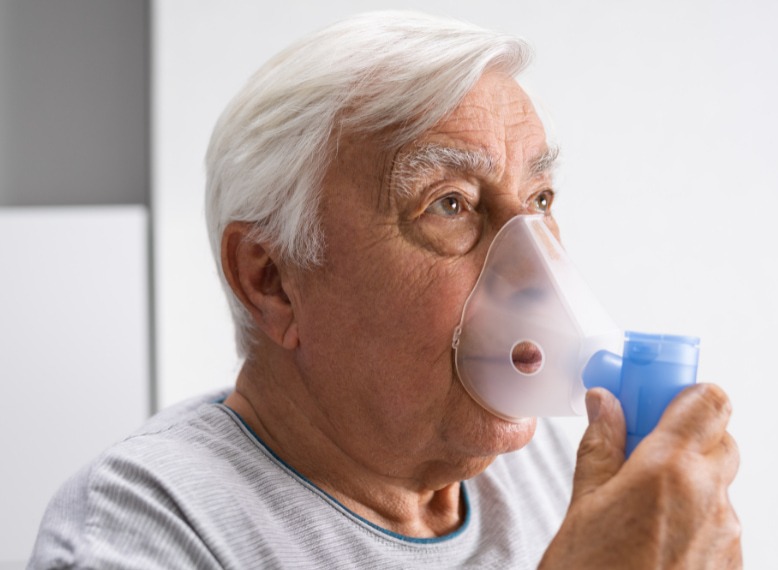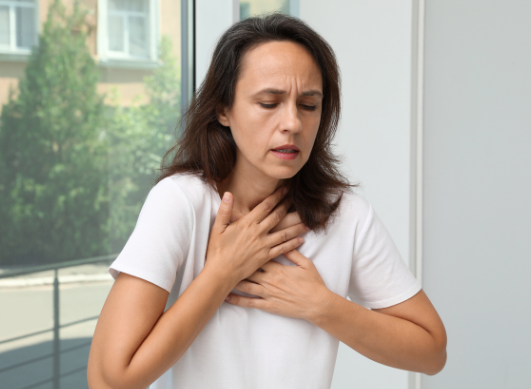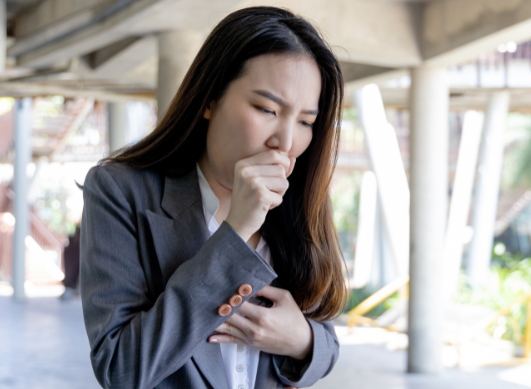COPD: understanding the effects of cold weather on the disease and avoiding exacerbations
Published Nov 21, 2023 • By Claudia Lima
Chronic Obstructive Pulmonary Disease (COPD) is a chronic respiratory condition, which can be difficult to manage during winter. The symptoms can worsen and patients may suffer from more exacerbations due to cold temperatures.
What are the effects of cold weather on COPD? How can patients better manage these effects and improve their quality of life?
Find all the answers in our article!

COPD: understanding its symptoms and risk factors
Chronic Obstructive Pulmonary Disease (COPD) is a chronic respiratory disease that affects the airways and the lungs. It is the seventh leading cause of ill health worldwide.
People with COPD experience breathing difficulties due to airway obstruction. The main symptoms are chronic coughing, sputum production and breathlessness.
The health of people with COPD deteriorates gradually; from time to time they suffer from episodes of flare-ups, or exacerbations, when their symptoms worsen suddenly. COPD cannot be cured, but appropriate treatment can slow its progression and even reverse some of the symptoms.
The main cause of COPD is prolonged exposure to irritants such as tobacco smoke. Other causes of COPD include passive smoking, pollution, occupational exposure to toxic substances, genetic inheritance and the consequences of certain diseases (lung cancer, cardiovascular disease), which also affect non-smokers.
In addition to these risk factors, cold weather can also have a significant impact on COPD patients.
The impact of cold temperatures on COPD
In cold weather, the body has to make extra efforts to maintain an optimal body temperature and protect itself from external attacks (microbes, viruses, etc.). The production and secretion of mucus from the ears, nose, throat and lungs is increased, in order to moisten mucous membranes dried out by dry winter air and central heating. Shivering, the purpose of which is to warm the body, also requires a great deal of energy.
Patients suffering from respiratory conditions are more likely to experience exacerbations of their symptoms if they are confronted with winter conditions (cold temperatures, dry air).
Here are the possible consequences:
Symptoms exacerbation
Cold temperatures can lead to the constriction of the airways, causing the bronchial muscles to contract. This reduces the diameter of the bronchial tubes and restricts airflow, increasing obstruction and making ventilation more difficult.
Coughing attacks become more frequent, as does the feeling of breathlessness and other COPD symptoms.
A higher risk of respiratory infections
Cold temperatures are often associated with an increase in respiratory infections, such as the flu and upper respiratory tract infections. Cold weather is not dangerous itself, but staying indoors with the indoor pollution is, as it makes viruses spread faster.
Cold air also irritates the mucous membranes of the respiratory tract, which tends to inhibit infection-fighting mechanisms. The bronchial tubes are covered with cilia, whose role is to expel microbes from the body. When it's cold, the activity of these cilia is weaker and they are less effective.
Moreover, people with COPD are more likely to develop respiratory infections because of their weakened respiratory system. Cold weather can further weaken their immune system, increasing the risk of infections.
Vascular constriction and hypoxia
Cold air can constrict blood vessels, including those in the lungs, which can lead to reduced blood flow to the lung tissues, exacerbating hypoxia (lack of oxygen) in people with COPD. Poor oxygenation can worsen symptoms and contribute to the deterioration of lung function.
How to limit the effects of cold temperatures on COPD symptoms?
People with COPD need to take extra precautions during winter months.
Avoiding respiratory infections
Firstly, people with COPD should discuss with their healthcare professional the appropriate management of the disease during the colder months. This may include adjustments in medication, a more detailed monitoring of symptoms and being prepared for flare-ups and symptoms worsening.
For example, you can ask your doctor whether you should be vaccinated against pneumococcal infections or the flu.
Barrier measures are also essential in preventing the transmission of viruses. You need to wash your hands regularly, cover your nose and mouth when sneezing and coughing, use tissues and, if necessary, wear a mask.
Protecting yourself from the cold
To protect yourself from the effects of the cold, it is essential to keep warm by wearing appropriate clothes. It is recommended to go out being well covered up, but at the same time you should avoid sweating, so don't cover up too much.
When out and about, remember to cover your head with a hat that covers your ears, wear a scarf and breathe through it to warm the air before it reaches your lungs.
You should breathe through your nose rather than through your mouth, as the nose filters warm and humidify the air, preventing thermal shock to the airways.
As for your home, remember to air it out for at least 15 minutes twice a day, morning and evening, even when it's cold, to remove damp and renew the indoor air.
Using appropriate heating devices indoors can also help maintain a comfortable room temperature. The temperature should not exceed 19°C in the bedroom and 21°C in other rooms. An overheated room encourages the emission of pollutants and dries out the ambient air, contributing to discomfort in the mouth, nose and bronchi. You should make sure that your heating system is working properly and that the air in the room is circulating correctly.
People suffering from respiratory diseases are also advised to avoid outdoor sporting activities in very cold weather. For the most sensitive, if an outing or a long walk is planned, it is possible, in agreement with their doctor, to slightly modify the treatment.
Other winter recommendations for people with COPD include:
- Controlling your illness by following your usual treatment,
- Having a well-balanced diet,
- Maintaining regular, appropriate physical activity,
- Monitoring your sleep patterns.
If your symptoms still become worse, see your doctor immediately. In case of emergency, call 911.
Cold weather can exacerbate COPD symptoms and increase the risk of respiratory infections in COPD patients. Appropriate management, combined with simple precautions, can help mitigate these adverse effects and improve the quality of life of people with COPD during winter months.
Give it a like and share your thoughts and questions with the community in the comments below!
Take care!
Sources :
Causes et prévention de la BPCO, vidal.fr
Fiche pratique : froid et santé respiratoire, sante-respiratoire.com
Que faire si le froid vous atteint, bas-rhin.gouv.fr
Asthmatiques, le froid peut avoir des conséquences sur vos poumons ?
BPCO, inserm.fr
Les bons réflexes pour se protéger des virus de l'hiver, sante-pratique-paris.fr

 Facebook
Facebook Twitter
Twitter



